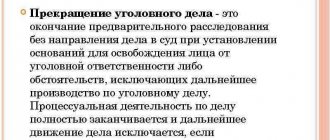Powers of the court in criminal proceedings
A court is a government body that administers justice in criminal proceedings, i.e.
reviewing and resolving criminal cases on the merits in court proceedings. According to the legislator, a court is any court of general jurisdiction that considers a criminal case on the merits and makes decisions provided for by the criminal procedure law (Code of Criminal Procedure of the Russian Federation).
Powers of the court (Code of Criminal Procedure of the Russian Federation):
- find a person guilty of committing a crime and impose punishment on him;
- apply compulsory medical measures to a person in accordance with the requirements of the Code of Criminal Procedure of the Russian Federation;
- apply compulsory educational measures to a person in accordance with the requirements of the Code of Criminal Procedure of the Russian Federation;
- terminate a criminal case or criminal prosecution against a person suspected or accused of committing a crime of minor or medium gravity with the imposition of a criminal law measure in the form of a court fine in accordance with the requirements of the Code of Criminal Procedure of the Russian Federation (if this person has compensated for the damage or otherwise made amends for the crime caused harm);
- overturn or modify a decision made by a lower court.
Only the court, including during pre-trial proceedings, is authorized to make decisions regarding restrictions on constitutional rights and freedoms).
More details
- on the selection of a preventive measure in the form of detention, house arrest, bail, prohibition of certain actions;
- on extending the period of detention, the period of house arrest, the period of prohibition of certain actions;
- on the placement of a suspect, accused, who is not in custody, in a medical organization providing medical care in an inpatient setting, or in a medical organization providing psychiatric care in an inpatient setting, for a forensic medical or forensic psychiatric examination, respectively;
- on compensation for property damage;
- on conducting an inspection of a home in the absence of the consent of the persons living in it;
- about conducting a search and (or) seizure of a home;
- about the seizure of an item pawned or deposited in a pawnshop;
- on conducting a search, inspection and seizure of a lawyer in accordance with Article 450.1 of this Code;
- on conducting a personal search, except for the cases provided for in Article 93 of this Code;
- on the seizure of items and documents containing state or other secrets protected by federal law, as well as items and documents containing information about deposits and accounts of citizens in banks and other credit organizations;
- on the seizure of correspondence, permission to inspect and seize it in communication institutions;
- on the seizure of property;
- on establishing the period of arrest imposed on property and its extension in the manner prescribed by this Code;
- on the temporary removal of a suspect or accused from office in accordance with Article 114 of this Code;
- on the sale, disposal or destruction of material evidence specified in subparagraph “c” of paragraph 1, subparagraphs “b”, “c” of paragraph 2, paragraphs 3 and 6 - 8, subparagraph “d” of paragraph 9 of part two of Article 82 of this Code;
- on the transfer free of charge of material evidence specified in subparagraph “c” of paragraph 9 of part two of Article 82 of this Code;
- on monitoring and recording telephone and other conversations;
- on obtaining information about connections between subscribers and (or) subscriber devices;
- on permission to cancel the decision to terminate a criminal case or criminal prosecution in the case provided for in part one.1 of Article 214 of this Code.
In addition, the court is authorized, during pre-trial proceedings, to consider complaints against the actions (inaction) and decisions of the prosecutor, investigator, inquiry agency and interrogating officer in cases and in the manner provided for by the criminal procedure law (Code of Criminal Procedure of the Russian Federation).
If during the judicial examination of a criminal case the following are revealed: circumstances that contributed to the commission of the crime; violations of the rights and freedoms of citizens; other violations committed during the investigation, preliminary investigation or during the consideration of a criminal case by a lower court, then the court or judge has the right to issue, respectively, a private ruling or resolution, which draws the attention of relevant organizations and officials to these circumstances and facts of violations of the law and requires the adoption of the necessary measures to eliminate them.
The court has the right to issue a private ruling or ruling in other cases if it finds it necessary (Part 4 of Article 29 of the Code of Criminal Procedure of the Russian Federation).
Court (judge) as a participant in criminal proceedings. Composition of the court and its powers
The court is the main participant in the criminal process and the subject of criminal procedural activities. Performing the function of considering and resolving cases, i.e. the function of justice, is his exclusive prerogative. Justice is a capacious concept that is not limited to activities in court proceedings at first instance. The concept of justice must include not only the activities of the courts of first and appellate instances in considering and resolving cases in court sessions, but also judicial supervision carried out by higher courts. This supervision has procedural forms and includes consideration of cases in the cassation procedure, in the order of supervision (in the narrow sense) and in view of new and newly discovered circumstances.
In addition, the concept of justice also covers such a type of judicial activity as judicial control at the stage of preliminary investigation, for which the following forms are provided: the adoption by the court of decisions on the use of preventive measures such as house arrest and detention, on the conduct of investigative actions that limit constitutional personal rights to privacy of correspondence, postal, telegraph and other messages, to inviolability of home, etc. (Part 2 of Article 29 of the Code of Criminal Procedure). Such judicial control is not a consideration of cases on the merits; it is not aimed at resolving the issue of criminal liability, but at creating conditions for preparing the case for trial and at protecting human rights in criminal proceedings. However, it would be wrong to separate preparatory judicial actions from the court’s consideration of the merits of the case and the adoption of a final decision on it. Judicial activity in a case is a unified system, all parts of which are in one way or another aimed at solving the main issue of the criminal process - the issue of criminal liability and in this sense are elements of justice. The fact that the judicial body begins its work at the stage of preliminary investigation only speaks of the high degree of development of judicial activity and its systemic nature.
Only the court has the power to:
1) find a person guilty of committing a crime and impose punishment on him;
2) apply compulsory medical measures to a person;
3) apply compulsory educational measures to the person;
4) cancel or change the decision made by the lower court.
Only the court, including during pre-trial proceedings, is authorized to make decisions:
1) on the selection of a preventive measure in the form of detention or house arrest;
2) on extending the period of detention;
3) on the placement of a suspect, accused, who is not in custody, in a medical or psychiatric hospital for a forensic medical or forensic psychiatric examination, respectively;
4) on conducting an inspection of the home in the absence of the consent of the persons living in it;
5) on conducting a search and (or) seizure of a home;
6) on conducting a personal search;
7) on the seizure of objects and documents containing information about deposits and accounts in banks and other credit organizations;
on the seizure of correspondence and its seizure in communication institutions;
9) on the seizure of property, including funds of individuals and legal entities held in accounts and deposits or deposited in banks and other credit organizations;
10) on the temporary removal of the accused from office;
11) on control and recording of telephone and other conversations (Until January 1, 2004, decisions on these issues are made by the prosecutor (Federal Law of December 18, 2001 No. 177-FZ). The court decision on paragraphs 1-5, 7 and 8 is entered into effective from January 1, 2004).
The court has the authority, during pre-trial proceedings, to consider complaints against the actions (inaction) and decisions of the prosecutor, investigator, inquiry agency and interrogating officer.
If, during the judicial consideration of a criminal case, circumstances are revealed that contributed to the commission of a crime, violations of the rights and freedoms of citizens, as well as other violations of the law committed during the inquiry, preliminary investigation or during the consideration of the criminal case by a lower court, then the court has the right to issue a private ruling or resolution, which draws the attention of relevant organizations and officials to these circumstances and facts of violations of the law that require taking the necessary measures. The court has the right to issue a private ruling or ruling in other cases if it finds it necessary.
Criminal cases are considered by the court collectively or by a single judge.
22. Composition of the court.
The composition of the court refers to the judges who are authorized to make a decision on the case as a result of a court hearing of both the first and appellate, cassation and supervisory instances.
Justice in criminal cases in the Russian Federation is carried out exclusively by courts of general jurisdiction that are part of the judicial system of the Russian Federation. These are, firstly, federal courts: the Supreme Court of the Russian Federation, supreme courts of republics, regional and regional courts, courts of federal cities, courts of autonomous regions and autonomous districts, district courts and military courts.
Secondly, these are magistrates belonging to the courts of the constituent entities of the Russian Federation. Art. 4 of the Federal Constitutional Law “On the Judicial System of the Russian Federation”) that the creation of courts not provided for by the said Law is not allowed. This serves as a guarantee against the creation of extraordinary and arbitrary trials.
In the procedural sense, the term “court” is used to refer not only
court as an institution, but also an individual judge acting within his competence. A judge is, according to paragraph 54 of Art. 5 of the Code of Criminal Procedure, an official authorized to administer justice. Judges include chairmen, deputy chairmen and members of courts. Jurors are not considered judges, since according to paragraph 1 of Art. 11 of the Federal Constitutional Law “On the Judicial System of the Russian Federation”, judges are only persons performing their duties on a professional basis. At the same time, jurors participate in the trial and rendering a verdict (clause 30 of article 5 of the Code of Criminal Procedure). So, the court can be composed of both judges (professional lawyers) and jurors representing the popular element in the court.
Criminal cases in the court of first instance are considered collectively or individually. Criminal cases are considered by one professional judge (single-person):
- district courts and garrison military courts, acting as courts of first instance when they make decisions during pre-trial proceedings in a criminal case (Articles 108, 125, 165 of the Code of Criminal Procedure);
- district courts, garrison military courts, as well as supreme courts of republics, regional (regional) courts, courts of federal cities, courts of autonomous regions and autonomous districts, district (naval) military courts, the Supreme Court of the Russian Federation when considering cases of all crimes (for with the exception of cases considered by the court with the participation of jurors, as well as in the composition of three professional judges);
- justices of the peace;
- appellate courts.
Consisting of three professional judges in the Russian Federation, there are
the following courts:
- district courts, as well as supreme courts of republics, regional (regional) courts,
courts of federal cities, courts of autonomous regions and autonomous districts, district (naval) military courts, the Supreme Court of the Russian Federation when considering cases of grave and especially grave crimes in the first instance, from among the jurisdiction of these courts, in the presence of a petition from the accused filed before the appointment of a trial meetings;
- courts of cassation and supervisory instances (the latter can act
also in a panel consisting of more than three judges).
Composed of one judge of the supreme court of a republic, a regional (regional) court, a court of a federal city, a court of an autonomous region or an autonomous district and a panel of 12 jurors, at the request of the accused, criminal cases of crimes specified in Part 3 of Art. 31, i.e. Relating to the jurisdiction of regional, regional and equal courts.
Composition of the court
The composition of the court is determined by the Code of Criminal Procedure of the Russian Federation.
Consideration of criminal cases is carried out by the court
- collegiately or
- judge alone.
The composition of the court for consideration of a particular case is formed taking into account the workload and specialization of judges in a manner that excludes influence on its formation by persons interested in the outcome of the trial, including using an automated information system.
The court of first instance may consider criminal cases in the following composition (depending on the category of cases, the Code of Criminal Procedure of the Russian Federation):
- judge of a federal court of general jurisdiction (solely);
- a judge of the supreme court of a republic, a regional or regional court, a court of a federal city, a court of an autonomous region, a court of an autonomous district, a district (naval) military court and a panel of eight jurors;
- judge of the district court, garrison military court and panel of six jurors
- a panel of three judges of the federal court of general jurisdiction;
- magistrate (criminal cases, jurisdictional cases).
Consideration of criminal cases on appeal is carried out:
- in a district court - by a judge of the district court alone;
- in higher courts - by a court composed of three judges of a federal court of general jurisdiction, with the exception of criminal cases of crimes of minor and medium gravity, as well as criminal cases with appeals, submissions against interim decisions of a district court, garrison military court, which are considered by a judge of the supreme court of the republic , regional or regional court, federal city court, autonomous region court, autonomous district court, district (naval) military court individually.
Consideration of criminal cases in cassation procedure is carried out:
- the judicial collegium for criminal cases of the cassation court of general jurisdiction, the military court of cassation, the Judicial collegium for criminal cases of the Armed Forces of the Russian Federation and the Judicial collegium for cases of military personnel of the Armed Forces of the Russian Federation, consisting of three judges, and
- by way of supervision - by a majority of members of the Presidium of the RF Armed Forces.
When a criminal case is considered by a court consisting of three judges of a federal court of general jurisdiction, one of them presides over the court session.
Criminal cases within the jurisdiction of a magistrate, committed by persons specified in the Code of Criminal Procedure, are considered by judges of garrison military courts individually in the manner established by this Code. In these cases, the verdict and decision can be appealed.
- criminal process
- Criminal procedural form
- Evidence
Main functions of the court
Note 1
The court is an integral part of criminal proceedings. In criminal proceedings, the main function of the court is to administer justice. Realizing the function of justice on the principle of equality of parties in a judicial competition, the court resolves the dispute between the participants of the prosecution and the defense.
The powers that the court exercises in the process of considering a criminal case are divided into several groups: administration of justice, control of pre-trial proceedings.
When administering justice (trial of a case on the merits), the court is authorized to:
- Bring charges against the person involved in the case and determine the punishment. An accusation of committing a crime is made by the court only at a court hearing, taking into account all the normative legal acts of the Criminal Code. On this topic, we have already completed the course work
; criminal law is described in more detail and is formulated in the court’s guilty verdict. The charge comes into force after the period for appealing it has expired. - Make a decision on compulsory medical examination or treatment of a subject of a criminal case who has committed a criminal act in an alleged state of insanity, make a decision on recognizing the insanity of this subject.
- In relation to a minor who has committed a crime of high or moderate gravity for the first time, a compulsory measure of education should be applied. To assign responsibility for what a minor has done to his parents, guardians, trustees, in the form of making amends for his guilt.
Are you an expert in this subject area? We invite you to become the author of the Directory Working Conditions
Note 2
Only a higher court can reverse or change the decision of a lower court.
The exclusive right of the court to make decisions that allow restrictions on civil rights during certain procedural actions:
- application of a preventive measure in the form of house arrest;
- extension of the term of imprisonment (house arrest, detention);
- forced placement of a suspect in medical or mental detention for treatment, conducting a forensic psychological examination;
- assignment of compensation for damage caused;
- forced inspection of a criminal’s home without the consent of the residents;
- conducting a search of the home and seizing material evidence;
- seizure of items deposited from a pawnshop as material evidence;
- seizure of objects and documents that contain state or other secrets protected by law, documents containing personal data of citizens that are not subject to disclosure;
- seizure of documents of communication enterprises, viewing of all correspondence and its seizure;
- arrest of all property of legal entities and individuals, arrest of bank accounts, etc.;
- temporary removal from office of subjects of a crime in accordance with Article 114 of the Code of Criminal Procedure On this topic, we have already completed the test work
Criminal Procedure Law, option 1 more details; - listening, monitoring, recording telephone conversations;
- destruction or sale of material evidence;
- requesting information about connections between subscriber devices.
Finished works on a similar topic
Course work The Court as a participant in criminal proceedings 440 ₽ Abstract The Court as a participant in criminal proceedings 280 ₽ Test work The Court as a participant in criminal proceedings 220 ₽
Receive completed work or specialist advice on your educational project Find out the cost





